- Home
- Margaret Mahy
Aliens In The Family Page 2
Aliens In The Family Read online
Page 2
Meanwhile, in the bathroom, with a chair pushed under the door handle to jam it closed, Dora was trying out smiles in the mirror, practising to be beautiful. She had practised and practised for a year, but so far nothing much had happened. Of course, once her braces were taken off her teeth she knew she would have a fascinating smile. In the meantime she had decided to concentrate on getting her hair right. Hidden away in the drawers of her dressing table were numerous bottles of hair dye. Though she had never dared to use it, Dora enjoyed reading the labels and imagining herself as 'Golden Glow' or 'Kiss of Fire'. But for now she had fair, bubbly curls—not bad, except for being a bit straggly around the bottom.
"I look as if I'm coming unravelled," she had complained at breakfast.
"I like you the way you are," said Philippa, "and so does David."
Of course Dora knew parents had to say things like that, yet she felt certain that at any moment now, a door would open somewhere, almost accidentally, and some wonderful person would be on the other side looking for a girl just like her. She tried to be prepared for this meeting at all times. Walking down the street she would study the people coming towards her, wondering Is this the one? Will this boy look at me and love me forever? Will this woman see me and stop in her tracks, crying "That's the very face for my new movie!" or "...to advertise our wonderful hair shampoo!" So working away in the bathroom, Dora smiled energetically and hastily tried on various clothes, determined to look her very best, wanting Jacqueline to like her, but not to feel better than her, nor to be any prettier.
At first she scarcely heard the rich, purring sound out in the driveway as David's car—the family's 'best' car—returned from its trip to the airport. Then she suddenly grew still with a smile of greeting fixed on her face as if it had been sprayed on. It was too late to do anything more. Anyhow she was as good as she possibly could be.
"Oh gosh, I'm nervous," said Philippa. "Should I run out and... no, I'll wait here and look easy-going. Get up on your feet, Lewis."
"What about Dora?" Lewis whined. "She won't come out of the bathroom."
"Wrong, wrong, wrong, Mr Smarty! Here I am!" cried Dora as she launched herself into the living room. You had to be careful how you looked at Dora, Lewis always thought, because if you looked at her in the wrong way she would sometimes burst into tears and slam doors. Still, it was hard to be sure of having the right expression on one's face when she came at you without warning, as she did now, wearing black jeans and a tight black jersey with sparkling bits all over it. Somehow this accentuated the glittering braces on her teeth which was a little unfortunate. The neckline plunged low on her chest but there was nothing much to stop it. A smooth teardrop of greenstone hung at the base of her neck on a silver chain. Although she was not wearing lipstick, knowing full well that Philippa would send her back to wipe it off again, Dora had certainly darkened her eyebrows and made her eyelids and lips shiny with a touch of Vaseline.
"You look very nice, Dora," said Philippa diplomatically, not daring to criticize in case she started a scene. It wouldn't look good with Jacqueline about to walk through the door. "Don't you think your blue shirt would've looked better though? A jersey looks so hot on an afternoon like this." They heard footsteps on the concrete path leading up from the garage.
"It's got a low neck," Dora babbled nervously, stroking the front with a loving hand, making the mother-of-pearl sequins ripple and shine. "Isn't it good value? I got it at the charity shop with my Christmas money. It was really cheap because it was such a small size. I'm very petite."
The front door opened and David came in first, carrying a small, faded pack. He was a short, quick man with teasing sad eyes like a clever monkey, but at that moment he looked incredulous and alarmed. He was followed by a tall, lanky creature wearing old blue jeans, a fringed suede jacket and a cowboy hat. Bright, stern eyes barely showed beneath the wide brim. David's Jacqueline came into the room like the Lone Ranger bursting in on a shifty group of cattle rustlers.
"Well, folks, here she is at last," exclaimed David. "My little Jacqueline." He glanced quickly at Philippa who bounded anxiously forward.
"Jacqueline—it's lovely to meet you at last." She hesitated then went to hug the cowboy. The cowboy held out a scratched brown hand with such a firm movement that Philippa had to change her mind and shake hands instead.
"Jackie, darling!" said David. "Don't be such a silly girl," and setting a good example he enveloped her in a big hug which she received stiffly.
"Call me Jake," she said to her father. "I told you in the car—that's what I'm called now. Jake."
To Dora, Jake appeared as foreign as if she really was a cowboy or something even stranger. She looked like an alien in the new house—a fierce Jake from outer space, there in the family sitting room.
Two - The Lone Ranger from Outer Space
Thus Dora realized that she had offered to share her bedroom with a creature of another species. It was not a nice thought. She had looked forward to sharing with long-haired Jacqueline because she hadn't made any close friends at school yet, and she loved friends. She had chosen to believe the shy photograph rather than the envelopes dripping with bloody ink, and had imagined she might take Jacqueline under her wing and teach her to do her hair in some pretty way—perhaps the sort of braid that the girls at school called a french plait. You could share a bedroom with someone who would enjoy learning to do their hair in a new way. But the Lone Ranger—even without a horse—was another matter altogether.
Meanwhile, Lewis was thinking things had turned out better than he would have believed they could. He studied Jake from a distance with new interest, trying to work out what the cowboy hat might really indicate.
"It's wonderful to have you here with us," David said, holding Jake's hand for a moment. It lay in his large hand like some small wild creature pretending to be dead so it would be set free again. David looked at her with uncertainty. "We're almost settled in now. As you can see, the house is a bit like a caravan—very tiny."
"We got it cheaply because it was so small," Philippa explained nervously, and added, as she always added, "We'll build on it in a year or two. How about something to eat? Did you have anything on the plane? Once you've had a cup of tea and some cake a place always seems more like home."
Jake nodded but said nothing. It was hard to judge her expression in the shadow of her hat.
"So let's have a good look at you." David reached out and firmly removed the cowboy hat from her head. Lewis held his breath, thinking Jake might whip out a six-shooter and force David to give it back. Jake did no such thing however, and Lewis saw clearly that she was just as helpless as he was, even if she was much taller. Dora stared in dismay. Jake's hair was cut as short as Lewis's. It was mousey brown and looked as if it had actually been nibbled off by mice while its owner slept.
Nits! thought Dora. She must have had nits! She almost melted away in horror. She then thought of the wall behind her bed in the room Jake was to share, pinned all over with pictures of Brooke Shields and other young beauties. Dora half-imagined these pictures would work on her like good spells while she was asleep so that when she awoke she would have grown to look a little more like them, but she saw at once that such pictures might actually seem insulting to someone with nibbled hair. And then she wondered miserably how you could tell immediately that someone was a declared enemy without them even saying a word. The long haired, shy Jacqueline in the photograph could have been a friend. But this Jake could be nothing but a foe.
Dora shifted her gaze from Jake to her pack. It was very small and very battered. It was unexpectedly pathetic. There was nothing sinister about it, but nothing nice either. No-one had lovingly packed it; no-one had gone to the trouble of ironing clothes for her to take away, or had worried about what a new, strange family might think of the way she dressed. Dora could tell all that from just the outside of the pack.
"Is this all you have?" an astounded Philippa asked.
"I don't need much
," replied Jake calmly. "Did you think I'd have a lot?" she said with a sudden smile. "I've got—you know—la la la..." She made a wavy gesture with her hand.
"And what does 'la la la' stand for, may I ask?" said David a little grimly.
"Right now it stands for clean pants, a toothbrush, a spare pair of jeans, a pair of sandals, and a book of horror stories." Jake shrugged. "It generally stands for lists of things not worth telling about."
Dora's heart missed a beat. She detested stories about monsters, vampires, ghosts, murderers and great battles between the forces of good and evil. She hated science fiction. What she enjoyed were ballet books about girls dancing beautifully in rose pink dresses, or homely comfortable stories, and, though she did not tell anyone, she still enjoyed reading her old copies of Milly Molly Mandy. Horror stories on the other hand filled her with dread, not because she actually believed in werewolves and vampires, but because the stories always suggested some unnamed thing, huge and hairy, moving through the darkness. Now she looked at Jake with despair. Jake smiled with one side of her mouth and not the other which looked more like a sneer. Picking up her pack, Jake hoisted it onto her shoulder with a movement that was easy but at the same time seemed resigned.
"Let me carry that for you," suggested David. "Come on, Jackie, don't be difficult."
"It's not heavy," she argued. "Anyhow, I'm used to carrying my own heavy things."
David took it from her all the same. "You're sharing—you've got to share—" he paused, "Dora's room."
Jake looked at Dora. "Right on!" she said quietly, unsmiling, and followed David. She might as well have said "That's the end! That's the absolute pits!"
"Mum," whispered Dora as the door closed behind Jake and her father, "I hate her."
"Don't be silly," Philippa whispered back. "Of course you don't. You can't! But... oh dear... she certainly is different from what David said she was like."
"He said she could ride horses. That all she thought about was horses. I thought she'd be the sort of person who wore a silk shirt and jodphurs—a real rider," muttered Dora.
"I thought David was being too confident," commented Philippa. "He wanted to believe things would be straightforward. Never mind! We'll manage."
"How long is she staying?" asked Dora.
"Not long! Well—just until the end of the school holidays." Philippa spoke in a subdued voice.
"That's ages. I think I might be glad to go back to school again, even though I am going to be in Mrs Winward's class!"
"Give her a chance, poor girl!" exclaimed Philippa. "In a day or two she'll probably be like one of us."
But Dora thought that families were like planets. Each had its own creatures breathing its own special air, and no-one as alien as Jake could ever live happily on their particular planet.
Three - Space Invaders
Gliding slowly down the street, Bond looked so bright and energetic that some people smiled to see him go by while others frowned, mistrusting his roller skates on a busy city footpath, or puzzled by his suit of many pockets. Pockets of orange, green and gold, all differently shaped, were sewn down the legs of his blue jeans, and there were others like bright windows on his brown shirt. He was still dazed by his surroundings, for although he had been given what the Galgonqua called 'false' or 'induced' memories which enabled him to recognize and understand the uses of things he had never seen before, it did not altogether take the surprise out of those things. That's a bicycle! thought Bond, amazed, for it seemed to him that the pedalling motion of the rider was winding up invisible thread from the road behind him.
As he skated weaving along the street, Bond was performing two functions—both part of his test. He was receiving all sorts of signals, but was trying to untangle one in particular—the faint, unconscious trace emitted by the 'missing' Companion. It was also part of the talent of the Galgonqua that they should record. So Bond looked at things differently from anyone else in the street—for he looked at everything twice. His first glance was the surprised one, and his second was the remembering one. He chose to remember the most ordinary things: empty Coca-Cola cans in the gutter, the ill-shaven old man selling lottery tickets and horse-racing news, people's cars, shoes, shorts, shirts, the chains around their necks, the rings on their fingers. Their faces interested him too but he didn't dare look at them long, in case they noticed his curiosity and studied him too closely.
He skated along, smiling as he went. Sometimes he would see something not included in his false memory file and then he would blink as if his mind was taking a photograph. Later, if he was successful, these details would be read off by the School and recorded in the gigantic Inventory of the Galgonqua which was eventually intended to hold all the information, feelings, memories, sensations, ideas, jokes, riddles, mysteries, answers and explanations in the entire universe. They had already been building it up for thousands of years but sometimes it seemed as if they had barely begun.
Though Bond drifted through the crowds without any apparent purpose, he was in fact following his clue. The faint impulse from the Companion was a thread he could follow, running through his head, a constant drone like the humming of a tiny fly, and growing more distinct when he turned his face to it—a thrill which he alone in the busy street could pick out of the air. Earlier in the day this sensation had been interrupted by distance, by his own confusion, by pneumatic drills, by the radios of taxis calling to each other across the city like animals separated from their herd, and even by the electronic presence of microwave ovens in restaurants and coffee bars. He had patiently picked his way through all this, untangling that one thread from all the threads the city offered him. But now it was constant. He had trapped it inside him and even began to feel his old confidence returning.
It's hot a difficult test after all, he thought, or perhaps it is—for others. He had always been very clever at detecting and unravelling the signals by which the Galgonqua kept in touch with one another. He was a tireless and deft unraveller. So at last, by following this impulse and recording as he went, he came to a particular shop and stood outside it, hesitant and uncertain.
Peering in at the door as a cautious animal might inspect a trap, Bond saw racks of old cardigans and dresses, somehow more sinister than new ones, as if ghosts had been trapped and strung up on coat hangers. Even from the door it seemed to Bond that the brown jersey on the front of the rack still carried the shape of the woman who had once worn it. He went in at last, feeling his skates, so quick and clever out on the footpath, grow clumsy and heavy on the worn, green matting. A woman sat knitting behind the counter.
"Can I help you, dear?" she asked.
"Just looking" replied Bond, and he did look with great curiosity at vases, china ornaments and old cups and saucers set on a shelf. On other shelves behind the woman were the more valuable things, including a black box studded with buttons and little dials. Bond knew at once that this was no ordinary transistor radio. This was what he was searching for—the Companion emitting its constant location call but giving no information about what had happened or why it was here in this shop or quite how he was to get it. He supposed it must be for sale and he had been issued with money—but had he been given enough? He felt frightened at the sight of the box, so square and dark in the shop full of ghosts. It seemed so open, so obvious, yet he was sure there must be a catch. All the time he hesitated he was aware that in that black square, under those studs and dials was unbelievably tiny and intricate machinery, and that set in a maze of pinpoint circuits was the voice, the reasoning and some of the powers of his older sister Solita. She had been sent down in this form to be part of his test, and also to record for the Inventory in a different and more complicated way than a young, untested student such as Bond could manage. The Solita in the box had been set in a state of unconsciousness but the School had told him that her brother's voice was one that might interrupt whatever strange mechanical dreams she was dreaming. He was to reclaim her, awaken her and bring her home.
"How much is the transistor?" Bond enquired casually. His blood chilled as the woman calmly pulled the knitting off her needles and rose, pointing them at his heart like twin swords. They were steel and very sharp.
"You must be the one," she said in a high, cold voice. Simultaneously, the curtains around the changing booth behind Bond were swept aside and a dark figure appeared—a man with white hair erupting around his forehead and chin as though he were more goat than man. His bumpy forehead even looked as though it might be growing horns, and his yellow eyes bulged.
"You!" the man snorted. "Did you not think there might be a trap for anyone the School sent down? Your people are not all-powerful, you know."
"Who are you?" Bond asked, appalled at being recognized, but even as he spoke, the answer—incredible and terrifying—came into his mind. Under the skin of his wrist throbbed a mechanism called 'the pulse' which enabled the School to trace his progress even though he could not contact the School. Contact until the proper time was strictly forbidden. He touched the pulse with his thumb.
"You're Wirdegen!" he cried. "You're trying to find a way into our Inventory!"
"Knowledge is the greatest treasure of all," said the man. "The woman there—she's nothing. She's under our control, as you will be in a minute."
Bond quickly turned and shouted across the counter to the Companion "Wake up Solita! Wake up!"

 Shock Forest and other magical stories
Shock Forest and other magical stories The Riddle of the Frozen Phantom
The Riddle of the Frozen Phantom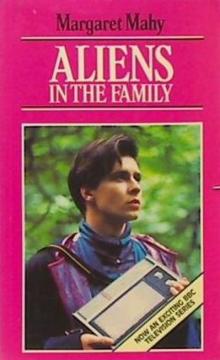 Aliens In The Family
Aliens In The Family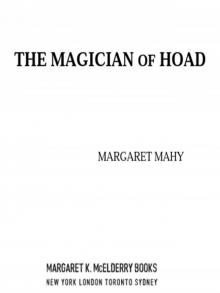 The Magician of Hoad
The Magician of Hoad Twenty-Four Hours
Twenty-Four Hours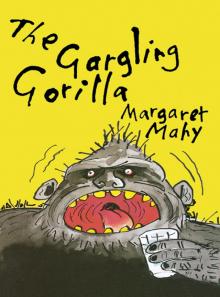 The Gargling Gorilla
The Gargling Gorilla Kaitangata Twitch
Kaitangata Twitch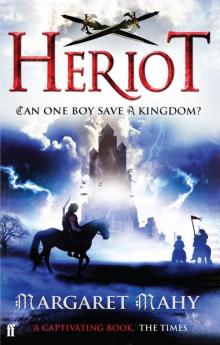 Heriot
Heriot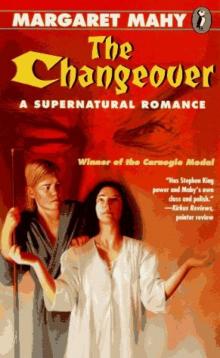 The Changeover
The Changeover